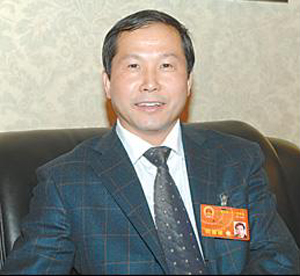Legislation urged regarding online shopping
- By Li Jingrong
 0 Comment(s)
0 Comment(s) Print
Print E-mail China.org.cn, March 8, 2012
E-mail China.org.cn, March 8, 2012
Online shopping, as a newly emerging activity, has enjoyed rapid development in China in recent years. Alongside this development, disorderly and unsystematic operations have appeared frequently. Some deputies to the National People's Congress (NPC) have called for legislation to better protect consumers' rights, the Nanfang Daily reported Wednesday.
|
Liao Renbin, general manager of Hunan Branch of China Telecom and deputy to the National People’s Congress (NPC). |
Liao Renbin, general manager of China Telecom's Hunan Branch, said the state should build an Internet credibility system to facilitate sound and orderly industry development.
"Online shopping has been written into Premier Wen Jiabao's Government Work Report this year. It is the trend of the times that the state should speed up legislation and strengthen supervision to protect consumers' legal rights," said Liao in his Microblog Wednesday.
The Nanfang Daily immediately conducted an online survey on Liao's opinion. Among the surveyed people, 55 percent "are not sure" of the proposed law, saying it depends on the specific regulations of the legislation. Some 18 percent agree that the legislation will thoroughly regulate the online shopping market, while 27 percent don't think the legislation will work, adding it will "meet with great difficulties."
According to China's Internet Data Center (IDC), the volume of online shopping reached 784.93 billion yuan (US$124.26 billion) in China in 2011, up 66 percent from the previous year. Trade disputes are a frequent occurrence. In Beijing, the number of complaints concerning online shopping accounted for one-third of last year's total.
Most of the complaints involve Internet fraud. Statistics from CCTV's "March 15 Evening Gala" program shows that among the complaints it has received, those related to online fraud are in first place by a healthy margin.
Minister of Commerce Chen Deming said during a NPC press conference on Wednesday that e-commerce has a bright future. "The government is actively exploring the legislative work of online shopping," he said.
Xu Xiaolan, vice president of China Information Industry Development Academy and also a member of the 11th National Committee of the Chinese People's Political Consultative Conference (CPPCC), submitted a proposal Wednesday about accelerating the drafting of an e-commerce development law. "The importance and urgency of legislation is why we submit this proposal," she said. "Consumer's rights are what we are most concerned about."
"China currently has no complete law to promote the healthy development of e-commerce, while regulations and rules are still too limited to systematically solve a series of problems," she said. "Therefore, legislation is imperative under these circumstances."
Zhou Xiaoguang, chairwoman of the Board of Neoglory Group, suggested the state issue the Law of Internet Trade as soon as possible to encourage and promote economic growth and social employment.
An executive in charge of Alibaba.com Corporation's research center hoped that law enforcement agencies strictly crack down on illegal Internet activities to guarantee the normal practice of e-commerce.
Ala Musi, deputy director of the Policy and Law Committee of China E-Commerce Association, said that legislation should "firstly analyze the problem thoroughly, and then have a modest innovation". "If we enact laws only within traditional frameworks, it will be difficult to solve actual problems effectively."






